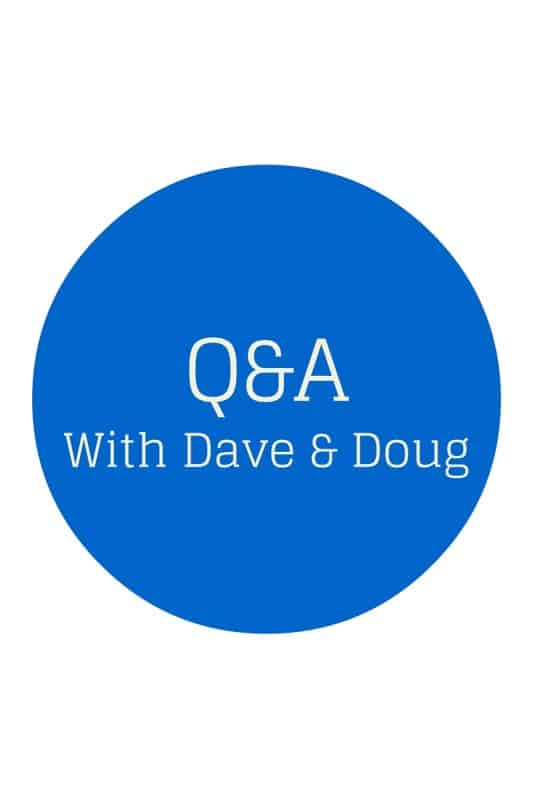Post author: Doug Hubler
I’ve known the Blue Gurus guys for a long time and I knew Jason Terry long before Blue Gurus existed. I’ve used them to help me in my business and trust them completely. But when I first read the post called “I’m Just Trying To Get Away From People That Suck” that Mic Johnson wrote back in 2011, I cringed!
How could somebody say that in a public/business forum and get away with it? It took guts to be that open and honest. I’ve always had a tough time sharing those kinds of feelings. (My wife can attest to the fact that I hold too much inside!)
Sometimes at Apex Business Advisors we take on clients who we know are going to be very challenging, but that’s just fine and it comes with the business. The hard part is being able to say “NO!” to someone who really sucks. The “suck” may not present its ugly head until after we’ve started working with them and it can really be hard to change direction once we’ve started working together.
In many cases, it probably makes sense for everyone to go their separate ways because we may not be fulfilling the client’s expectations at that point either. The fact is…we’re in an extremely stressful environment every day – and that’s when things go well.
So I’m taking Mic’s advice and asking my co-brokers to do the same thing! Life is too short and too precious! I would like also like to add the following reminders to Mic’s list:
- Stay away from people who only see the negative in every statement or action.
- Stay away from those who can’t trust your good intentions and who think there must be ulterior motives.
- Stay away from those who can’t seem to tell the truth.
Read Mic’s blog and I think you’ll understand more what I’m talking about…
“I’m Just Trying To Get Away From People That Suck!”
A few months ago I had some time in between clients and I called Jason to share an, as Oprah would call it,”A-HA” moment.
In the weeks and months leading up to that call, I had been spending a lot of time reflecting on every step of my career to gain a better understanding of why it took me nearly 15 years to find something that I love to do every day.
I reflected on why I took each position over the course of my career, what my mindset was at the time, what I thought was important (size of company, salary, etc.), and so on. I also spent a lot of time analyzing the motivating factors that led me to leave each of those positions.
Going through the process taught me a lot about my career, but taught me even more about who I am as a person and what is core to my DNA. One of the most important lessons I learned is something that opened my eyes in more ways than one and helped lay the foundation for making real, positive, and lasting change in my life. The exact words I told Jason to describe this, and what I now believe is one of my secrets to career and life happiness, is this:
“I’ve realized that, my whole career, I’ve just been trying to get away from people that suck!”
 Jason laughed (as does every single person I tell the story to) because he knew exactly the type of people I was talking about. And I’m guessing you do too. Now I’m not literally saying that these people are bad people, have ill intent, or don’t have redeeming qualities. What I am saying is that there are certain characteristics about people that suck vs. people that are awesome. The sooner you learn to identify one vs. the other, the sooner you will become a much happier person in your career….and in your life.
Jason laughed (as does every single person I tell the story to) because he knew exactly the type of people I was talking about. And I’m guessing you do too. Now I’m not literally saying that these people are bad people, have ill intent, or don’t have redeeming qualities. What I am saying is that there are certain characteristics about people that suck vs. people that are awesome. The sooner you learn to identify one vs. the other, the sooner you will become a much happier person in your career….and in your life.
Now that I have been fortunate enough to have learned this valuable lesson (way later in life than I wish I would have, but better late than never, right?), I feel it is my duty, my responsibility, in fact I believe it’s part of my calling, to share it with you so that you don’t waste one more second of your time on these type of people. I realize that my definition of “people that suck” may be different than yours and that’s OK. In the end, my goal in writing this article is simple and honest: I want you to get to your place of happy quicker than I did.
One of the most difficult things about this process is you are going to have to make some hard decisions. You need to know that “people that suck” come in all shapes and sizes. They could be coworkers. They could be managers. They could be neighbors. They could be business associates. They could be CEOs. They could be friends. They could be family members. Whoever they are, it’s important to know that your goal through this process is to remove as many “people that suck” from your day-to-day life and replace them with “people that are awesome”.
That may mean a job change. That may mean changing the way you’ve always done things. That may mean letting some people go that have been a part of your life for a long time. That may mean having some difficult conversations. That may mean being honest with yourself and with other people in your life in a way that you haven’t been before. That very likely will mean taking some calculated risks. It’s not an easy road. Not by any stretch of the imagination. But trust me when I tell you that it is absolutely, positively a road worth traveling.
Ok, so how do you identify them? Take a look at the two lists below, one focusing on “People That Suck” and one focusing on “People That Are Awesome.” This is nowhere close to an exhaustive list (my fingers would get tired of typing!), but it should help get you started.
10 Characteristics Of People That Suck
1. They don’t return calls in a timely manner.
2. They don’t respond to emails in a timely manner.
3. They attend networking events or groups with a “selling” mindset instead of a “helping” mindset.
4. They are TAKERS who routinely try to befriend GIVERS.
5. They don’t do what they told you they would do. Lack of common courtesy and accountability.
6. They rarely make an effort to do anything more than the bare minimum.
7. Their #1 priority in virtually every situation is “What’s in it for me?”
8. They make excuses. Lots of them. About everything.
9. They have a unique ability to rarely, if ever, look in the mirror and realize that they are a part of the problem.
10. They fight CHANGE with every fiber in their body. Their mentality of “that’s just the way things have always been done” or “that’s just the way I’ve always been”, as if sucking is in their DNA.
At the same time, it’s important to know how to identify people that are awesome. When you surround yourself with people that are awesome, that is when the magic happens. You know it when you see it. In fact, I “feel” it when I’m around these type of people.
10 Characteristics Of People That Are Awesome
1. At their core, they LOVE helping people…without expecting anything in return. Helping is core to their DNA.
2. They give more than they take.
3. They return calls in a timely manner.
4. They return emails in a timely manner.
5. They CONSISTENTLY do what they tell you they are going to do. Accountability and common courtesy are built into the way they live their personal and professional lives.
6. They tout the success stories of other people around them.
7. They always say “Thank you”.
8. CARING is in their DNA.
9. They look at the bigger picture and understand the real value in raising other people up instead of just themselves.
10. They are natural connectors/referrers.
What do you think? What other characteristics have you witnessed from people that suck and people that are awesome? How have you gone about finding happiness in your career and in your life? I welcome and encourage your insight.
 A recent lunch conversation with Dave Seitter, a partner with Spencer Fane LLP, and Doug Hubler with Apex Business Advisors, regarding the sale and acquisition process of businesses served as inspiration for this blog and a series to follow.
A recent lunch conversation with Dave Seitter, a partner with Spencer Fane LLP, and Doug Hubler with Apex Business Advisors, regarding the sale and acquisition process of businesses served as inspiration for this blog and a series to follow.
 Jason laughed (as does every single person I tell the story to) because he knew exactly the type of people I was talking about. And I’m guessing you do too. Now I’m not literally saying that these people are bad people, have ill intent, or don’t have redeeming qualities. What I am saying is that there are certain characteristics about people that suck vs. people that are awesome. The sooner you learn to identify one vs. the other, the sooner you will become a much happier person in your career….and in your life.
Jason laughed (as does every single person I tell the story to) because he knew exactly the type of people I was talking about. And I’m guessing you do too. Now I’m not literally saying that these people are bad people, have ill intent, or don’t have redeeming qualities. What I am saying is that there are certain characteristics about people that suck vs. people that are awesome. The sooner you learn to identify one vs. the other, the sooner you will become a much happier person in your career….and in your life. Every deal is different.
Every deal is different. Part of having a successful business is occasionally needing to add or replace staff. Fortunately, at Apex, our experience has been pretty good over the years with finding and retaining good brokers.
Part of having a successful business is occasionally needing to add or replace staff. Fortunately, at Apex, our experience has been pretty good over the years with finding and retaining good brokers. In this latest deal, there were several advisors on both sides that couldn’t help but to raise blood pressure and point out that their clients were going to get scr****(taken advantage of), the price was going to get renegotiated, the person on the other side was an enemy to watch rather than a partner to work with, and surely the other side had no intention of completing the deal.
In this latest deal, there were several advisors on both sides that couldn’t help but to raise blood pressure and point out that their clients were going to get scr****(taken advantage of), the price was going to get renegotiated, the person on the other side was an enemy to watch rather than a partner to work with, and surely the other side had no intention of completing the deal.





 I want to share a lesson in paranoia. It’s one of the easiest ways to kill a deal. Why? Because it often removes reason and logic from the buying or selling equation.
I want to share a lesson in paranoia. It’s one of the easiest ways to kill a deal. Why? Because it often removes reason and logic from the buying or selling equation. It’s impossible to help people when they are not open and honest. As advisors we need to really understand our client’s situation so that we can develop a successful buy or sell strategy. Building a trusting relationship is critical.
It’s impossible to help people when they are not open and honest. As advisors we need to really understand our client’s situation so that we can develop a successful buy or sell strategy. Building a trusting relationship is critical.